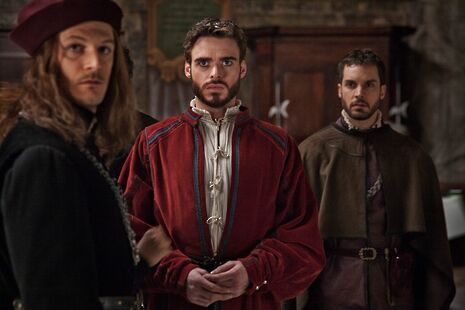VisCourse: A Medicean Mess
After watching Netflix’s “Medici: Masters of Florence”, Josh Kimblin wonders what historians should make of historical dramas

The old adage goes that you should never meet your heroes. As Netflix’s latest series, Medici: Masters of Florence, draws to a close, I am convinced that there should be an additional admonition: historians should never watch historical dramas about their favourite figures. Disappointment is the only outcome.
I have been pining for a television series on the Medici family for a long time. The tale of how a single banking family came to dominate Renaissance Florence – with intrigue, assassinations and encounters with famous artists along the way – is engrossing and innately cinematic. Having studied and written extensively about the founder of the dynasty, Cosimo de’Medici, in an academic context, his appearance on the silver screen was eagerly awaited. Unfortunately, the series is more mediocrity than magnificence – a Medicean mess.
A historical drama has two duties: first, to make compelling viewing; and second, to give the audience a taste of a foreign age. More often than not, these should trump pedantic concerns with accuracy. Dramas are designed to entertain, rather than inform. Who would criticise La Reine Margot, that other great Medicean drama, for its stylised gore or historically dubious plot when it has such power?
“It also steals the romping sex scenes from Game of Thrones and appropriates the over-loose frilled-shirt look from The Tudors.”
In this case, however, the historical inaccuracy is simply careless. The costume department has dressed early 15th century Florentines in late 16th century English doublets, while the prostitutes of Rome are a cross between velvet-clad sex dolls and 17th century French milkmaids. In a similar way, the action sequences stretch the viewer’s credibility. Although historians often write of the “cloak-and-dagger nature” of Renaissance realpolitik, the show takes rather too much inspiration from Assassin’s Creed.
The real damage is done by the historical botching in the plot. The show’s premise is that Cosimo’s father was a Florentine political kingpin – a Renaissance Vito Corleone – and that he was murdered. This is poppycock; Giovanni de’Medici consciously avoided politics and died peacefully in his bed. However, the decision to ignore reality transforms the series into an extended whodunnit and unleashes a series of cliches. Continuing along a painfully obvious ‘mafia’ theme, the show borrows the dysfunctional mafioso family dynamics from The Godfather. It also steals the romping sex scenes from Game of Thrones and appropriates the over-loose frilled-shirt look from The Tudors.
The tragedy is that Medicean power was so much more engaging and sophisticated than the fiction which Netflix presents. For once, fact trumps fiction. Cosimo was not simply a local mafia boss with some artistic taste but a master at reconciling apparently irreconcilable forces. For example, the Florentine constitution prevented the rule of one man or family, but everybody from the Venetian ambassador to the Byzantine emperor knew power resided in Cosimo’s villa, not in the Signoria’s palace. Canon law condemned money-lenders to burn in hell, but Cosimo was the banker and friend of numerous Popes. Above all, he was the wealthiest man alive but renowned for his public modesty. How’s that for a complicated figure?
In Netflix’s account of the Renaissance, the moral and religious complexity of Richard Madden’s Cosimo never extends beyond him praying repeatedly (always in the wrong church) and looking glum whenever somebody is murdered on his account. The complexity of Florentine politics is reduced to a cheap (Americanised) dichotomy between “old” aristocratic oligarchy and “new” meritocratic liberty. Finally, the presence of the Medici’s artistic and architectural acolytes is nothing more a gimmick to help the audience to remember their 9th grade “World History” curriculum. Filippo Brunelleschi, the famed architect of Florence’s cathedral dome, is introduced with the line: “I am a genius, ahead of my time.” I was too busy retching to hear the rest.
Historical dramas are best when they are intelligent and provocative: consider the uncompromising vision of slavery presented in 12 Years a Slave or the poignancy of Schindler’s List. They should transport us to another time but also remind us of the universal qualities (or problems!) of humanity. Above all, they should match the intelligence, wisdom or emotional power of their subject matter. In this case, the themes of money and power, image and reality, salvation and damnation cannot help but stimulate. So please, Netflix, do right by Cosimo and your audience and do a better job next time?
 Comment / Plastic pubs: the problem with Cambridge alehouses 5 January 2026
Comment / Plastic pubs: the problem with Cambridge alehouses 5 January 2026 News / Cambridge businesses concerned infrastructure delays will hurt growth5 January 2026
News / Cambridge businesses concerned infrastructure delays will hurt growth5 January 2026 News / New movement ‘Cambridge is Chopped’ launched to fight against hate crime7 January 2026
News / New movement ‘Cambridge is Chopped’ launched to fight against hate crime7 January 2026 News / AstraZeneca sues for £32 million over faulty construction at Cambridge Campus31 December 2025
News / AstraZeneca sues for £32 million over faulty construction at Cambridge Campus31 December 2025 Interviews / You don’t need to peak at Cambridge, says Robin Harding31 December 2025
Interviews / You don’t need to peak at Cambridge, says Robin Harding31 December 2025









